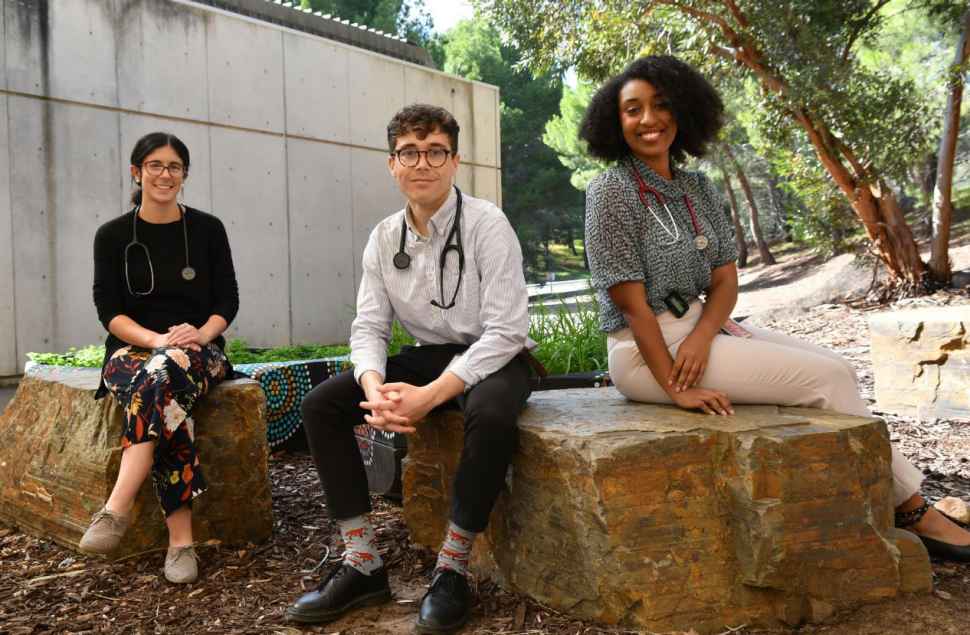COVID-19 has only made this more urgent—not only for preparing medical professionals who are pandemic prepared, but for helping alleviate the sudden stress on South Australia’s health systems.
Student safety has been of paramount importance and consideration.
“There has been heightened anxiety amongst the existing workforce, who are understandably concerned about the rapidly changing impact of the virus,” says Dr Julie Halbert of the College of Medicine and Public Health.
“This can lead to differing opinions among clinical supervisors as to the merits of continuing clinical placements. We addressed this by writing and widely distributing clear guidelines for clinical placements, in partnership with medical students and healthcare provider partners.
“We went to great lengths to make these placements as safe as possible, including instigating refresher PPE [personal protective equipment] training, and encouraging clinical supervisors and students to negotiate appropriate activities that would not increase the risk of COVID-19 exposure—for the students, other staff, or the patients—while still facilitating learning in the clinical environment.”
These measures allowed for the deployment of close to 300 Flinders medical students currently enrolled in their final two years to support South Australian medical staff along with nursing, midwifery and allied health students. Almost 173,000 hours of invaluable nursing support has been provided by 675 Flinders trainee nurses to South Australian hospitals and health care facilities throughout the COVID-19 crisis so far.
President of the Flinders Medical Student Society Liam Ramsey is one of these students, working in paediatrics at Flinders Medical Centre (FMC). He was keen to share his insights on the benefits of this experience in The Medical Journal of Australia, in an article co-authored with Dr Halbert and Associate Professor Alison Jones, Education Dean of the College of Medicine and Public Health.
“This ‘real-life’ learning is invaluable. We’ve seen health governance operationalised, witnessed senior clinicians act thoughtfully and with intent, despite their own anxiety, and watched professional practice role modelled in the provision of good communication and a sense of humanity and compassion for sick patients,” he says.
“Students also contribute a significant emotional and empathy capacity to healthcare. We often have more time to sit with patients and connect with them. Patients often find students extremely comforting and their fresh energy uplifting. We should not forget the humanity that students bring to our healthcare centres every day,” he says.
Flinders University staff across both the College of Medicine and Public Health and the College of Nursing and Health Sciences also place a high priority on the continuation of placements.
Professor Jonathan Craig, Vice-President and Executive Dean of the College of Medicine and Public Health, says, “Ultimately, we are accountable to the community”.
“We are training the next generation of clinicians. I think the community would want us to train the next generation of clinicians to cope with whatever comes around the corner, and that includes a pandemic.
“This might be new to Australia, but let’s not forget the Spanish Flu epidemic, let’s not forget SARS [severe acute respiratory syndrome], let’s not forget MERS [Middle East respiratory syndrome]—these were massive epidemics in the countries they affected. We take our accountability to the public and ensuring that we develop a fit for-purpose workforce very seriously.”
“COVID-19 is something none of could have foreseen, but it’s part of what you have to be able to cope with and manage when you are a health professional and when you are training to be a health professional,” says Professor Alison Kitson, Vice-President and Executive Dean of the College of Nursing and Health Sciences.
“We very much want to work with our health partners on how best to support the students during this time, so they have this opportunity for what will be an incredibly important learning experience for them.”
The University is also deeply committed to ensuring students are able to fulfil the clinical learning necessary for them to complete their medical training and to graduate. The impacts of NOT doing so have already been demonstrated in both Canada and Hong Kong, where the interruptions to clinical training caused by SARS delayed the graduation of final year medical students and disrupted first year residency positions.
Flinders staff also recognise just what an important role students play as part of the medical workforce, especially at a time when resources are stretched.
“Even though COVID-19 has reared its ugly head, all of the usual health problems—asthma, heart attacks, stroke, etcetera—are still affecting people,” Professor Craig says. “So, this is an area where students can contribute as critical members of the workforce, albeit as trainees.”
The continuation of placements during the pandemic has been made possible by the University’s co-location with Flinders Medical Centre, and close partnership with the Southern Adelaide Local Health Network (SAHLN), and other healthcare providers across metropolitan Adelaide, rural South Australia and the Northern Territory.
The Director of the Flinders Medical Program, Associate Professor Rosalie Grivell, says student leaders and the medical program leadership “are extremely grateful, now more than ever, for the strong relationships between students, academics, teaching staff and healthcare providers, and mindful that, when healthcare and education come together, everyone benefits—current and future patients, healthcare providers, and students”.
Many of our students are experiencing financial hardship due to COVID-19 restrictions. You can help by giving to the Matthew Flinders Scholarship Fund, ensuring that talented students of today continue their studies and fulfil their potential for tomorrow.
Tax exemption number for charitable donations: 65 542 596 200



